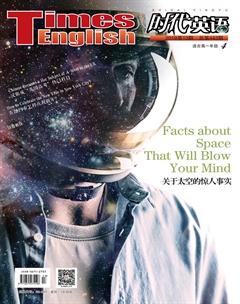关于太空的惊人事实
Sunsets on Mars are blue.
火星的晚霞是蓝色的。
The Curiosity Mars rovers first color photograph of a sunset in 2015 revealed a surprising twist—sunsets on Mars are blue.
NASA said this is because “dust in the Martian atmosphere has fine particles that permit blue light to penetrate the atmosphere more efficiently than longer-wavelength colors” like yellow, orange, and red.
2015年,“好奇号”火星探测器拍下第一张彩色日落照,这让人们惊讶地发现,火星的晚霞是蓝色的。
美国宇航局表示,这是由于火星大气层的尘埃颗粒较小,散射蓝光的能力强于长波颜色,如黄色、橙色、红色。
Space is full of “space junk”.
太空里全是“垃圾”。
Space is full of junk like used rocket parts and dead satellites. These objects continue to orbit Earth at about 17,500 mph—10 times as fast as a speeding bullet.
The Space Surveillance Network (SSN) keeps track of how much debris is out there. The SSN is currently tracking 23,000 objects larger than a softball.
Space junk is dangerous because one collision could trigger a chain reaction of objects hitting each other, resulting in a thick cloud of debris that would make space travel extremely dangerous.
太空里全是垃圾,如報废的火箭部件和卫星。它们继续以约17 500英里的时速绕行地球——是子弹飞行速度的10倍。
美国太空监视网一直在追踪太空中的垃圾数量,目前共有2.3万件体积大于垒球的太空垃圾。
太空垃圾非常危险,因为它们一旦发生碰撞,就可能会造成连锁反应,由此产生的厚厚的“垃圾云”会让太空飞行变得极为危险。
The Apollo astronauts footprints on the moon could last up to 100 million years.
“阿波罗”宇航员在月球表面留下的脚印可存在1亿年。
Moon rocks erode at a rate of 0.04 inches (about 0.1 centimetres) every 1 million years. This means that the astronauts footprints on the moon from the Apollo mission in 1969 could be there for 10 to 100 million years.
月球岩石的侵蚀速率为0.04英寸(约0.1厘米)/100万年。也就是说,1969年美国宇航员执行阿波罗任务时在月球表面留下的脚印能够存在1千万年到1亿年。
Space isnt always cold. In fact, it can get pretty hot.
太空不总是冰冷的。事实上,它可以很炎热。
In the darkest parts of space, temperatures can reach -454 degrees Fahrenheit (about -270 celsius degrees). But if youre orbiting near Earth in the sunlight, it can reach 250 degrees Fahrenheit (about 120 celsius degrees). Astronauts spacesuits are white to reflect the heat they encounter while floating above the Earth.
在太空最阴暗的地带,温度可达零下454华氏度(约零下270摄氏度);但若处于地球附近的阳光里,温度可达250华氏度(约120摄氏度)。宇航员的太空服是白色的,在他们漂浮在地球上方时,白色太空服可以隔绝热气。
A year on Venus is shorter than a day there.
金星的一年比一天短。
Venus spins very slowly in the opposite direction of Earth— 243 Earth days for a full rotation. But it only takes 225 days to go around the sun because its so close to it. Therefore, a year on Venus is shorter than a day.
金星自转速度很慢,而且和地球自转方向相反——金星自转一周需要243个地球日,但金星绕太阳公转一周仅需225个地球日,因为金星离太阳很近。因此,金星的一年比一天短。
The International Space Station (ISS) is the size of a football field.
国际空间站和美式橄榄球场差不多大。
The International Space Station is 357 feet (about 109 metres) long, just 3 feet (about 0.9 metre) less than an American football field. It weighs 925,000 pounds (about 84 kilograms) and is the largest single human-made structure to ever enter space.
The ISS has been visited by 230 people from 18 different countries to conduct research and carry out missions.
国际空间站长357英寸(约109米),只比美式橄榄球场少3英寸(约0.9米),重92.5万英镑(约84万千克),是迄今为止太空中最大的人造建筑物。
已有来自18个国家的230人到访过国际空间站,开展研究和执行任务。
You would last about 15 seconds in space without a spacesuit.
若沒有太空服,你能在太空中坚持15秒左右。
Because theres no pressure in space, air expands. This means the air inside your lungs would expand and tear through the tissue. And in such an extreme environment, your body would use up all of the oxygen in your blood in about 15 seconds. Other gruesome consequences of unprotected space exposure would include loss of bowel control, boiling blood, exploding capillaries, and bloating.
由于太空中没有压力,空气膨胀。这意味着你肺部内的空气会膨胀并撕裂组织。在这种极端环境中,身体会在15秒内耗光血液中的氧气。此外,还会出现其他的可怕状况:大便失禁、血液沸腾、毛细血管爆裂、身体膨胀。
Outer space isnt empty space.
太空并非完全真空。
Besides the obvious stars and planets, you might think that the surrounding space is completely empty—a perfect vacuum devoid of all matter.
Its true that space is a vacuum, but its an imperfect vacuum because it contains a low density of particles like clouds of interstellar dust, space plasma, and cosmic rays.
你或许认为,除了恒星和行星外,太空是完全的真空,是不存在任何物质的完全真空。
没错,太空是真空的,但它并非完全真空。它还含有星际尘埃云、空间等离子体、宇宙射线等低密度物质。
Word Study
encounter /?n'ka?nt?/ v. 遇到;遭遇
The doctor had encountered several similar cases in the past.
expand /?k'sp?nd/ v. 膨胀;扩大
Engineers noticed that the pipes were not expanding as expected.

